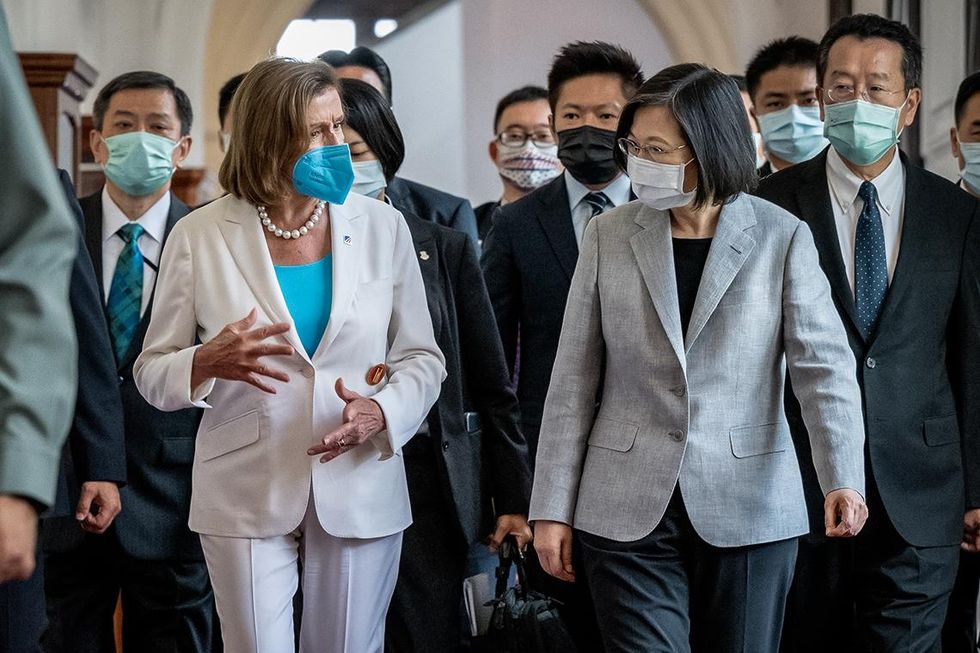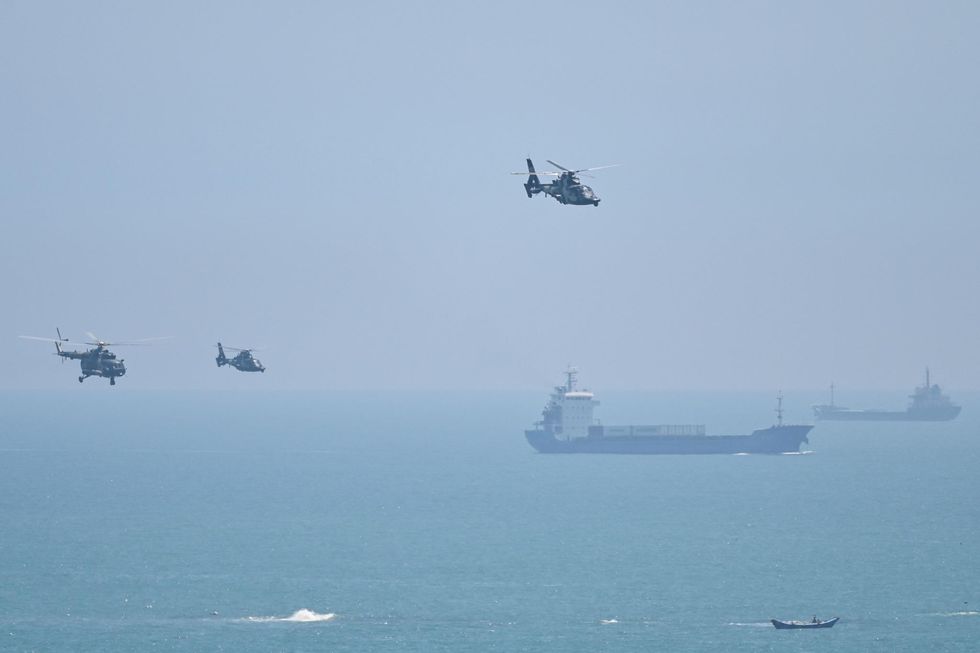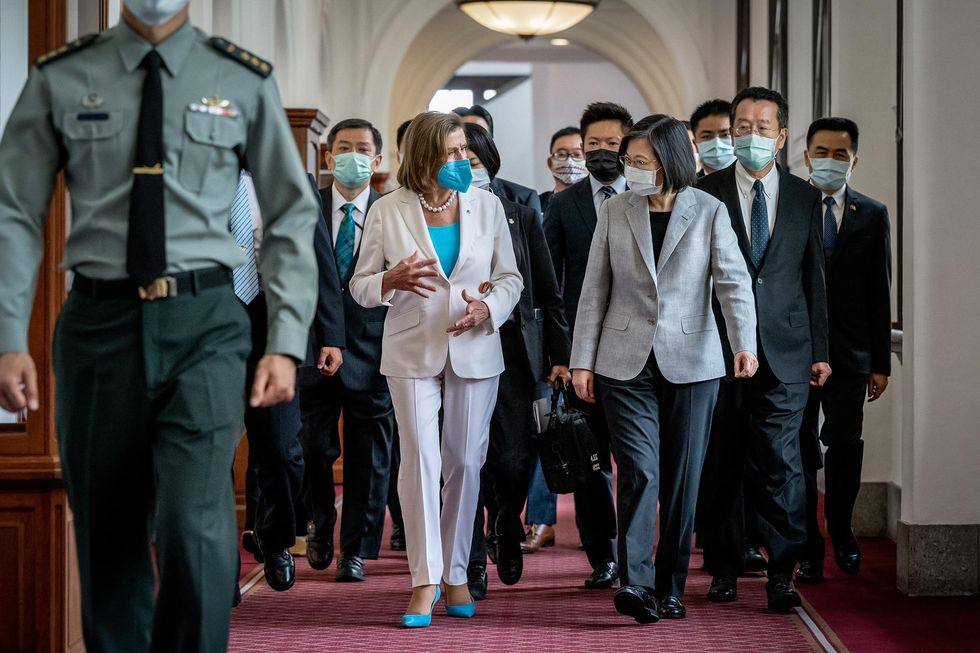Trending Now
We have updated our Privacy Policy and Terms of Use for Eurasia Group and its affiliates, including GZERO Media, to clarify the types of data we collect, how we collect it, how we use data and with whom we share data. By using our website you consent to our Terms and Conditions and Privacy Policy, including the transfer of your personal data to the United States from your country of residence, and our use of cookies described in our Cookie Policy.
{{ subpage.title }}
Pelosi’s Taiwan trip is a gift to China
Pelosi’s Taiwan trip is a gift to China
Between the passage of the Inflation Reduction Act and the CHIPS Act, the successful assassination of al-Qaeda leader Ayman al-Zawahri without collateral damage, a blockbuster jobs report that laid to rest any talk ofrecession, a sharp decline in inflation expectations on the back of 57 straight days of falling gas prices, and solidly red state Kansas voting down abortion restrictions, the Biden administration has had an exceptional couple of weeks.
But there is one bit of very bad news raining on Biden’s parade: House Speaker Nancy Pelosi’s visit to Taiwan has increased tensions between the U.S. and China to their highest point since the Tiananmen Square massacre.
The political status of Taiwan has long been a central sticking point in U.S.-China relations. While de facto an independent and self-governing entity that considers itself a sovereign state, Taiwan is considered by mainland China and by the international community—including the United States—as a part of “one China.” Beijing claims it as a province of China and seeks to eventually achieve reunification, peacefully if possible but by force if necessary. For its part, Washington’s position is one of “strategic ambiguity”: guided by the Taiwan Relations Act, the United States acknowledges China’s claims on Taiwan (i.e., the “One-China” principle) at the same time as it opposes both unilateral unification and Taiwanese independence—all the while lending economic and military support to enable Taiwan to defend itself from coercion.
Want to understand the world a little better? Subscribe to GZERO Daily by Ian Bremmer for free and get new posts delivered to your inbox every week.
 Nancy Pelosi meets with Taiwan's President Tsai Ing-wen in Taipei on August 3.Chien Chih-Hung/Office of the President via Getty Images
Nancy Pelosi meets with Taiwan's President Tsai Ing-wen in Taipei on August 3.Chien Chih-Hung/Office of the President via Getty Images
Under President Xi Jinping, China has turned more assertive about reunification, which Xi considers one of the primary goals of his rule and a necessary condition for the country’s “rejuvenation.” As China’s economic and military capabilities have grown and the balance of power has moved in Beijing’s favor, Chinese intimidation of Taipei and incursions into the Taiwan Strait have become increasingly commonplace, heightening the risk of confrontation.
However, ever since watching the Russian invasion of Ukraine galvanize a once“brain dead” transatlantic alliance overnight, Xi had adopted a more cautious stance on Taiwan, fearing that any move toward coercive reunification would be met with strong and united opposition from America and its allies—potentially risking a humiliating military defeat, devastating economic sanctions, and sweeping diplomatic isolation. This was a risk Xi was not willing to take in the run-up to the 20th Party Congress, where he’s set to secure a norm-defying third term in power.
House Speaker Nancy Pelosi’s visit to Taiwan last week upended that calculus.
Despite clear and consistent Chinese warnings as well as opposition from both President Biden and American allies, the soon-to-be-retired 82-year-old congresswoman unilaterally made a highly consequential foreign policy decision for personal reasons, without U.S. strategic goals in mind. Knowing that Biden opposed the move and had no interest in a near-term conflict over Taiwan, Xi Jinping suddenly found himself able to shift the status quo in his favor with minimal risk of retaliation.
And that’s exactly what he did. So far, China has blocked food imports from and suspended sand exports to Taiwan. They launched cyberattacks on Taiwanese infrastructure. They conducted unprecedented live-fire military drills effectively surrounding Taiwan. They launched missiles over Taiwanese territory. They flew aircraft into Taiwan’s air defense identification zone and crossed the median line. Many of these exercises are likely to continue for at least the next month. And on Wednesday, China withdrew an earlier promise not to deploy troops to Taiwan following an eventual reunification.
 Chinese military helicopters perform drills near Taiwan. Hector Retamal/AFP via Getty Images
Chinese military helicopters perform drills near Taiwan. Hector Retamal/AFP via Getty Images
Pelosi’s unnecessary provocation gave Xi cover to engage in meaningful yet carefully calculated escalation, chipping away at Taiwan’s sovereignty and increasing its presence in the Taiwan Strait with virtually no consequences. While this crisis is very unlikely to lead to war between the U.S. and China, it increases the odds of accidents and miscalculation and further erodes whatever guardrails exist to prevent direct military conflict.
Importantly, the crisis highlights America’s structural credibility deficit on the global stage, weakening the United States and emboldening China. In the eyes of U.S. friends and foes alike, domestic political division and dysfunction cast doubt on America’s long-term commitments and strategic orientation. Beijing will seek to exploit these vulnerabilities going forward, waiting for the U.S. to make additional unforced errors that allow China to change the status quo in Taiwan with minimal risk of retaliation.
Unfortunately for the United States—and Taiwan—there may be plenty such opportunities in the near future. Should Republicans take the House in November’s midterm elections (as expected), for example, the new Republican House Speaker would likely lead a larger and more rhetorically provocative congressional delegation to Taiwan than Pelosi did, prompting China to escalate further without risking a significant response from President Biden. A potential constitutional crisis after the 2024 presidential election would also encourage China to act while the U.S. is consumed by infighting.
As is too often the case these days, the greatest threat to American interests is American dysfunction.
🔔 And if you haven't already, don't forget to subscribe to my free newsletter, GZERO Daily by Ian Bremmer, to get new posts delivered to your inbox.
Analysis: Pelosi's Taiwan visit increases U.S.-China tensions but won't lead to war
Analysis: Pelosi's Taiwan visit increases U.S.-China tensions but won't lead to war
House Speaker Nancy Pelosi, the most powerful member of the United States Congress, has now returned from a trip to Asia, which included a stopover in Taiwan. The fallout from that visit has only just begun.
When media reports first appeared that she wanted to go, China’s government began issuing warnings of grave consequences. The U.S., Chinese officials insisted, was playing with fire. What’s more, Joe Biden, the embattled U.S. president and leader of Pelosi’s Democratic Party, made clear through surrogates and leaks to the media that he thought a stop in Taiwan was an unnecessarily provocative and poorly timed idea. His administration is trying to cool rising tensions with China, and Biden knew Pelosi’s trip would do the opposite.
Pelosi decided to go because she knows she is nearing the end of her political career and wants to be remembered as a leader unafraid to stand up for a determined democracy trapped in the shadow of a giant authoritarian bully.
Want to understand the world a little better? Subscribe to GZERO Daily by Ian Bremmer for free and get new posts delivered to your inbox every week.
 Nancy Pelosi meets with Taiwan's President Tsai Ing-wen in Taipei on August 3.Chien Chih-Hung/Office of The President via Getty Images
Nancy Pelosi meets with Taiwan's President Tsai Ing-wen in Taipei on August 3.Chien Chih-Hung/Office of The President via Getty Images
Want to understand the world a little better? Subscribe to GZERO Daily by Ian Bremmer for free and get new posts delivered to your inbox every week.
Pelosi’s supporters point out there is precedent for such a visit. A quarter century ago, then-House Speaker Newt Gingrich ignored shrill warnings from Beijing and went to Taipei.
But much has changed in 25 years. America’s global military power remains unrivaled, but China’s own military might, at least in its immediate neighborhood, is now far greater than it was. In the 1990s, China had to accept that threats to directly confront the United States Navy wouldn’t add much muscle to its negotiating leverage. Today, the balance of force is far less clear.
And the timing is far more sensitive, because China is weeks away from a historic party congress at which President Xi Jinping, architect of China’s aggressive foreign policy, will choreograph his own coronation for a third term that breaks with modern China’s history of institutional rule. This is not a time when China’s leader will shrug off an American act of assertiveness that he’s already denounced.
The most important thing that Pelosi’s stopover in Taiwan has accomplished is to once again underline the unsustainable absurdity of the U.S.-China agreement on Taiwan. China’s government continues to pretend it has the right to force 23 million citizens of democratic Taiwan to accept the right of China’s Communist Party to impose a police state on them. Washington goes on pretending that it cares as much about Taiwan’s future as China does. The official policy of the United States is to recognize that there is only “One China” in theory but to leave open the possibility it will fight a war to prevent Beijing from using force to create “One China” in practice.
President Biden has added to the confusion by insisting on three separate occasions that America would fight China to protect Taiwan, a statement studiously avoided by past presidents. Despite his clear declarations, representatives of his White House have tried to protect America’s strategic ambiguity by insisting that Biden has not changed U.S. policy.
Meanwhile, China’s foreign minister described Pelosi’s Taiwan visit as "manic, irresponsible and highly irrational” before China responded to it by firing ballistic missiles into the sea, a show of frustrated fury worthy of a North Korean strongman.
The greatest worry is that Pelosi’s visit has set new precedents. China’s live-fire military exercises in waters Taiwan considers to be within its territory will make still-greater provocations in the future much more likely. Xi is now more likely to use the Party Congress to set new redlines on Taiwan that future American officials will be tempted to test.
The U.S. and China are not on the verge of war. Both governments recognize that in today’s globalized world, there is no Berlin Wall to protect one side’s security and prosperity from the other’s potential turmoil. Both live with the threat of mutually assured economic destruction.
But Pelosi’s provocative trip allows China’s military to rehearse for a future war, pushes China’s leaders to save face by drawing new Taiwan redlines, and raises new doubts about the long-term stability of Taiwan’s economy. Beijing’s belligerent response, in turn, encourages China hawks in Washington to continue to push hard on Taiwan—without a credible plan of response if push one day comes to shove.
🔔 And if you haven't already, don't forget to subscribe to my free newsletter, GZERO Daily by Ian Bremmer, to get new posts delivered to your inbox.
Face mask couture: Which world leader wore it best? Global leaders in the COVID era
Fashion has always gone hand-in-hand with global politics, and mask-wearing during the COVID-19 era is no different. Ian Bremmer investigates on GZERO World.
State of the Union showdown
Exclusive video of President Trump's plans for his big speech.
A Big Beautiful Border Wall
She wants him out, he wants a wall – now they've reached compromise that helps them both out.
Congress Has Become A Race To The Bottom
Congress has become a "race to the bottom". Jane Harman, Director, President, & CEO of The Wilson Center, and former member of congress, sits down with Ian and looks at the dysfunction taking place in legislative branch of the US government.
A House Divided: Who’s To Blame?
Do Democrats Hate Republicans? And Do Republicans Hate Democrats? This week on GZERO World, we look at the political divide in America. It's widening. Can Americans all just get along?




